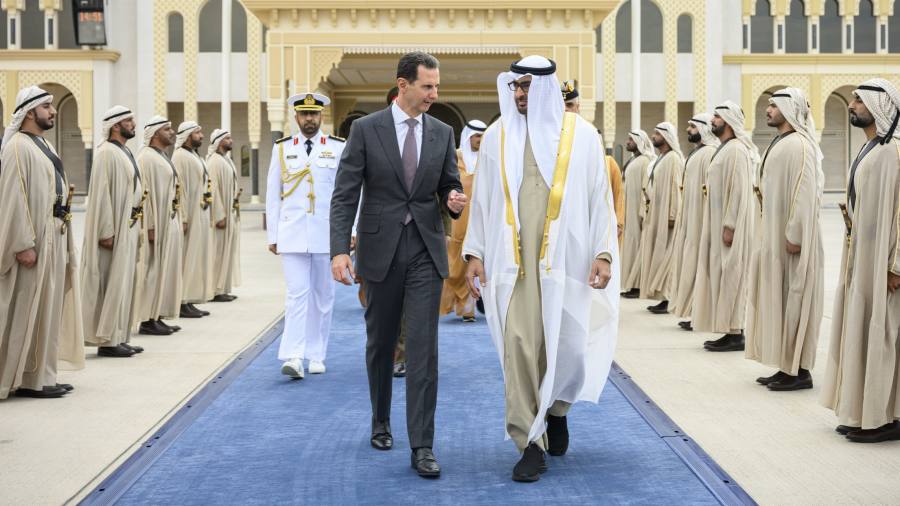A human rights group has condemned the invitation to Syrian president Bashar al-Assad to the UN COP28 climate summit from the UAE hosts as a ‘sick joke’, while the US and UK governments stood by the host’s right to issue it.
The Syrian leader, who was invited to the COP28 conference last week by the United Arab Emirates as the host country for the conference, has not attended a global summit since the outbreak of his country’s devastating civil war in 2011.
But Syria was readmitted to the Arab League of nations this month and Assad was warmly welcomed at the gathering last week, as Saudi Arabia led efforts to improve relations in the region.
The US National Security Council said that it was “up to the UAE who they invite to COP”, in a statement to the FT. But the US had “no plans to normalise relations” with the Assad regime, it added, without “authentic progress” on resolving the conflict in Syria.
The UK government also said invitations for COP28 were “a matter for the host country” and the UN. However, the government “remains opposed to engagement with the Assad regime and we believe they must be held accountable for the human rights abuses and violations they have committed”.
The UN’s climate arm also said the UAE as the host was responsible for inviting heads of state and government, and noted that the UN General Assembly had “restrictions in place for two governments, Afghanistan and Myanmar”.
Amnesty International said the COP28 invitation to Assad was not “remotely about tackling the climate crisis” but “part of an insidious normalisation process designed to maintain impunity for leaders across the region.”
“Given that Assad’s forces have used chemical weapons and flattened entire towns and cities in a murderous scorched-earth military campaign, it’s a sick joke to imagine that he’ll take the slightest interest in dealing with the human rights crisis of climate change,” said Kristyan Benedict, Amnesty International UK’s crisis response manager.
Human Rights Watch said it was “inconceivable that a government would get away with such persistent crimes against humanity without any accountability”.
The UAE, along with Saudi Arabia, has been gradually resetting relations with Assad. Despite resistance from some other Arab states, UAE officials have been engaging with the pariah state over issues such as the return of refugees and curbing illegal trade in the narcotic Captagon, which has become an economic lifeline for Damascus.
On Saturday, the G7 group of nations said the international community “should only consider normalisation and reconstruction assistance once there is authentic and enduring progress towards a political solution” in Syria.
The COP28 hosts have justified the invitation to Assad by saying it is committed to “an inclusive COP process”.
In 2010, Syria’s climate change report submitted to the UN noted that recurring and worsening droughts had “reduced available water supplies”, and that “most Syrian cities currently have a water supply deficit”.
The COP28 summit has drawn criticism from climate campaigners since the appointment earlier this year of Sultan al-Jaber, the head of the Abu Dhabi National Oil Company, as president-designate. Since his appointment, he has advocated for the oil and gas industry.
Ugandan climate activist Vanessa Nakate said global leaders at COP must “advocate for the interest of all and not just their own country — or indeed, their own company”.
Additional reporting by Aime Williams in Washington
Read the full article here




